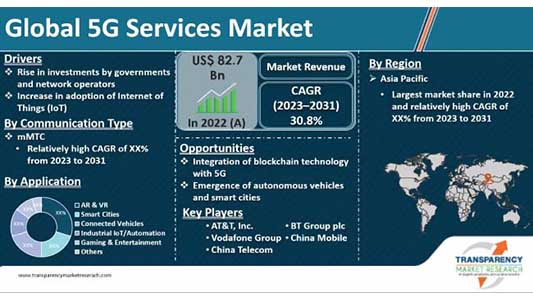The digital landscape is rapidly evolving, with innovations in telecommunications spearheading transformative changes. One such innovation that has been gaining significant traction is 5G technology, the fifth-generation standard for web networks. According to projections, the Global 5G Services Market Size is set to soar from USD 82.7 Billion in 2022 to a staggering USD 919.4 Billion by 2031, exhibiting a remarkable Compound Annual Growth Rate (CAGR) of 82.7% during the forecast period.
The Evolution of 5G Services
5G represents a paradigm shift in wireless communication technology, promising unprecedented speed, reliability, and connectivity. Unlike its predecessors, 5G offers multigigabit data transmission rates, with peak speeds reaching up to 20 Gbps. This remarkable speed, coupled with ultra-low latency of less than five milliseconds (ms), heralds a new era of possibilities across various sectors, particularly in industries where real-time data processing is critical.
Initially embraced by cell phone manufacturers, the adoption of 5G services has since expanded exponentially, with a particular focus on enhancing wireless communication infrastructure. Key projects such as smart cities, intelligent buildings, and advanced industrial applications heavily rely on robust network connectivity, thereby driving the demand for 5G services. Moreover, the proliferation of cloud-based applications has further fueled the need for advanced network infrastructure, prompting governments worldwide to invest in fostering 5G deployment.
Navigating Through COVID-19 Challenges
The onset of the COVID-19 pandemic brought unprecedented challenges, disrupting economies and reshaping business landscapes. However, amidst the chaos, the significance of 5G technology became more pronounced. Organizations across various sectors leveraged 5G capabilities to facilitate remote work, ensuring business continuity in the face of adversity. The pandemic accelerated investments in 5G technology, with industries increasingly relying on its capabilities to enable seamless remote operations, enhance security measures, and support emerging technologies such as IoT, AR/VR, and autonomous systems.
Segment Insights: Unveiling Market Dynamics
1. Managed Services Segment Dominance
In the realm of 5G services, managed services emerge as a dominant force, commanding the largest revenue share over the forecast period. These services play a pivotal role in optimizing network operations, enhancing performance, and ensuring superior end-user experiences. With a primary focus on cost reduction and operational efficiency, managed services have become indispensable for organizations seeking to harness the full potential of 5G technology.
2. GSM’s Growth Trajectory
Among the various technological segments, GSM (Global System for Mobile Communication) stands out, witnessing significant growth momentum. Renowned for its broad coverage, robust security features, and support for diverse applications, GSM remains a preferred choice for many users. Its compatibility with a wide range of devices, coupled with reliable voice and data transmission capabilities, positions GSM as a cornerstone of the 5G ecosystem.
3. eMBB’s Market Dominance
In terms of communication, enhanced Mobile Broadband (eMBB) emerges as the frontrunner, capturing the largest share of the 5G services market. Its widespread adoption across residential and commercial domains underscores its versatility and appeal. From enabling high-speed data access to facilitating immersive experiences such as 4K video streaming and virtual meetings, eMBB represents a cornerstone of the 5G revolution.
4. Commercial Sector Driving Growth
The commercial sector emerges as a key growth catalyst, accounting for the lion’s share of the market revenue. Fueled by the growing demand for enhanced broadband speeds and seamless connectivity, industries such as IT & telecommunications, manufacturing, and media & entertainment are spearheading the adoption of 5G services. The proliferation of virtual meetings and the escalating need for high-speed data transmission further bolster the commercial segment’s dominance.
Regional Dynamics: Asia Pacific Leads the Charge
Asia Pacific asserts its dominance in the global 5G services market, boasting the largest market share over the forecast period. The region’s burgeoning population, coupled with rapid technological advancements, creates a fertile ground for 5G proliferation. Countries like South Korea, Japan, and China are at the forefront of innovation, driving the adoption of 5G services across diverse sectors. The growing demand for cloud-based solutions and emerging technologies further amplifies the region’s embrace of 5G technology.
Navigating Future Frontiers
As the world hurtles towards a future defined by digital connectivity, the trajectory of 5G services remains poised for exponential growth. Key industry players are actively shaping this landscape, with a focus on innovation, strategic partnerships, and technological advancements. From enabling enterprise private 5G network deployments to revolutionizing consumer experiences, the potential of 5G technology knows no bounds.
Charting the Path Ahead
In conclusion, the journey of 5G services is marked by unprecedented growth, propelled by technological innovation and evolving consumer needs. As we navigate through the complexities of a digital age, the transformative power of 5G technology serves as a beacon of progress, unlocking new possibilities and reshaping industries. With Asia Pacific leading the charge and innovative solutions on the horizon, the future of 5G services appears brighter than ever.
These insights are based on a report on 5G Services Market by TMR.












